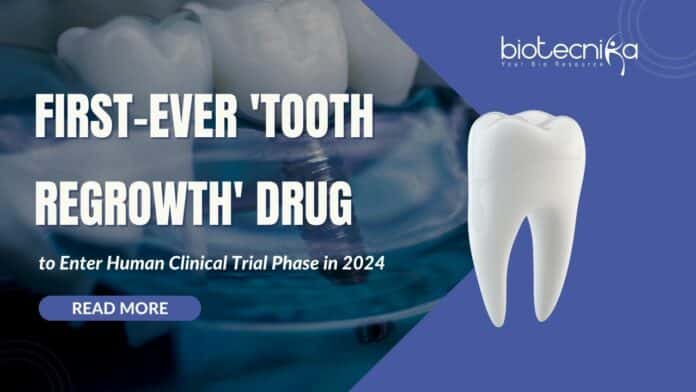First-Ever Tooth Regrowth Drug
A groundbreaking achievement by a group of Japanese researchers has given rise to a medication capable of regrowing teeth in adults, an innovation that is set to embark on human clinical trials.
The scientists from Kyoto University and the University of Fukui concentrated their studies on a protein known as USAG-1. This protein, produced by a specific gene, was discovered to inhibit dental growth. They found that an antibody designed to target USAG-1 could provoke tooth growth in mice affected by tooth agenesis, a birth defect.
In their research paper published in the journal Science Advances, the scientists discussed their ‘tooth regrowth’ medication. If proven successful, it could help individuals suffering from a congenital disorder called Anodontia – a condition that prevents the formation of a full set of teeth, affecting approximately 1% of the population – to grow a new set of teeth.
As reported by Mainichi, a national Japanese news outlet, the researchers are slated to initiate clinical trials in July 2024 and anticipate making the treatment available to the public by 2030.
This research is pioneering in its demonstration of how monoclonal antibodies can benefit tooth regeneration, offering a novel therapeutic approach for
a clinical issue that currently relies on implants and other artificial solutions.One of the primary investigators of the study, Katsu Takahashi, a senior lecturer at Kyoto, acknowledged their initial uncertainty about whether suppressing USAG-1 would suffice to promote tooth growth. However, he explained that the fundamental molecules that govern tooth development were already known.
He mentioned the critical roles of BMP (bone morphogenetic protein) and Wnt signalling in tooth morphogenesis. Predicting that it might be safer to target the elements that oppose BMP and Wnt during tooth development, the researchers turned their attention to the USAG-1 gene.
The team explored the impacts of several monoclonal antibodies on USAG-1, a type of treatment frequently used for cancers, arthritis, and vaccine development. USAG-1 engages with both BMP and Wnt, leading to poor birth and survival rates in the mice with several antibodies, which underlined the significance of both BMP and Wnt in overall growth. Yet, one antibody stood out as it only interrupted the interaction of USAG-1 with BMP.
Tests with this antibody disclosed that BMP signalling plays a vital role in determining the number of teeth in mice. Furthermore, a single dose was sufficient to produce a complete tooth. Subsequent experiments yielded similar positive outcomes in ferrets, creatures whose dental patterns closely resemble those of humans.
“Traditional tissue engineering falls short for tooth regeneration. Our research indicates that cell-free molecular therapy is effective for a broad spectrum of congenital tooth agenesis,” stated Manabu Sugai from the University of Fukui, another author of the study.
Latest news on First-Ever Tooth Regrowth Drug



























